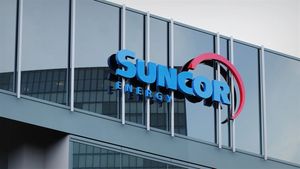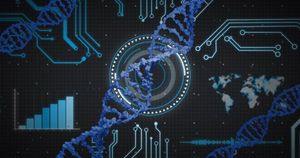Financial News
Datopotamab Deruxtecan Plus Durvalumab Demonstrated Robust and Durable Tumor Responses in First-Line Treatment of Patients with Metastatic Triple Negative Breast Cancer in BEGONIA Phase 1b/2 Trial
- Daiichi Sankyo and AstraZeneca’s datopotamab deruxtecan plus durvalumab showed a confirmed objective response rate of 79%
- Two ongoing phase 3 trials are evaluating datopotamab deruxtecan in patients with triple negative breast cancer
Updated results from the BEGONIA phase 1b/2 trial for the cohort of patients treated with datopotamab deruxtecan (Dato-DXd) plus durvalumab (Arm 7) showed that the combination demonstrated durable tumor responses and no new safety signals in patients with previously untreated advanced or metastatic triple negative breast cancer (TNBC) with six months additional follow-up from the previous data cut-off. These results were presented today during a mini oral session (379MO) at the European Society for Medical Oncology (#ESMO23) 2023 Congress.
Datopotamab deruxtecan is a specifically engineered TROP2 directed DXd antibody drug conjugate (ADC) being jointly developed by Daiichi Sankyo (TSE: 4568) and AstraZeneca (LSE/STO/Nasdaq: AZN).
Approximately 300,000 people worldwide are diagnosed annually with TNBC, the most aggressive breast cancer subtype.1,2 Less than half of patients with metastatic TNBC respond to current first-line treatment options which can include chemotherapy alone or in combination with an immunotherapy.2,3,4 Among patients with tumors that respond to initial treatment, disease progression is common and rapid, often occurring within two years.2,4,5,6
Results showed that datopotamab deruxtecan plus durvalumab, an anti PD-L1 therapy, demonstrated a confirmed objective response rate (ORR) of 79% (95% confidence interval [CI]: 67-88) including six complete responses (CRs) and 43 partial responses (PRs). Responses were observed regardless of PD-L1 expression level. Median progression-free survival (PFS) was 13.8 months (95% CI: 11-not calculable [NC]) and median duration of response (DoR) was 15.5 months (95% CI: 9.9-NC) with 11.7 months of follow-up.
“These results for datopotamab deruxtecan plus durvalumab in the first-line triple negative breast cancer setting are highly encouraging, particularly the 79% objective response rate,” said Peter Schmid, MD, Barts Cancer Institute, London, United Kingdom, and investigator in the trial. “This magnitude of response is especially notable given the majority of patients in this cohort have PD-L1 low tumors, representing a population for whom treatment has long been limited to standard chemotherapy.”
The safety profile of datopotamab deruxtecan in combination with durvalumab was consistent with the known safety profiles of both agents. Grade 3 or higher treatment-emergent adverse events (TEAEs) occurred in 57% of patients. The most common grade 3 or higher TEAEs were increased amylase (18%), stomatitis (11%), constipation (2%), fatigue (2%), vomiting (2%) and decreased appetite (2%). There were three interstitial lung disease (ILD) events adjudicated as drug-related by an independent committee including two grade 2 events and one grade 1 event.
“Disease progression after initial treatment is a reality for patients with triple negative breast cancer, underscoring the need for more durable treatment options,” said Mark Rutstein, MD, Global Head, Oncology Clinical Development, Daiichi Sankyo. “These findings showcase the potential of datopotamab deruxtecan in previously untreated advanced triple negative breast cancer and, following the positive results of our TROPION-Breast01 phase 3 trial, build on the growing body of evidence for the potential use of this TROP2 directed antibody drug conjugate, alone and in combinations, in several subtypes of breast cancer.”
“Progress in the first-line advanced triple negative breast cancer setting has been modest for years and new therapeutic strategies are needed to improve outcomes for patients with this aggressive breast cancer subtype,” said Cristian Massacesi, Chief Medical Officer and Oncology Chief Development Officer, AstraZeneca. “These updated results from the BEGONIA trial reinforce our confidence in the potential for datopotamab deruxtecan to become a new, important treatment modality in this setting as we eagerly await results from our ongoing phase 3 triple negative breast cancer program.”
In Arm 7 of the BEGONIA trial (n=62), the majority of patients (n=54) had tumors with low PD-L1 expression (tumor area positivity [TAP]<10%). Seven patients had tumors with high PD-L1 expression (TAP≥10%). As of the February 2, 2023 data cut-off, 29 patients (47%) remained on study treatment.
Summary of BEGONIA Arm 7 Efficacy Results
Efficacy Measure (as assessed by investigator) |
All Patients (n=62) |
Confirmed ORRi, % (95% CI) |
79% (n=49) (66.8-88.3) |
CR rate, % |
10% (n=6) |
PR rate, % |
69% (n=43) |
Median DoR (months) (95% CI) |
15.5 months (9.9-not calculable) |
Median PFS (months) (95% CI) |
13.8 months (11.0-not calculable) |
CI, confidence interval; CR, complete response; DoR, duration of response; ORR, objective response rate; PFS, progression-free survival; PR, partial response |
|
i ORR is (complete response + partial response) |
|
Daiichi Sankyo and AstraZeneca have two phase 3 trials evaluating datopotamab deruxtecan in patients with TNBC. TROPION-Breast02 is comparing datopotamab deruxtecan to chemotherapy in patients with previously untreated locally recurrent inoperable or metastatic TNBC who are not candidates for anti-PD-1/PD-L1 therapy. TROPION-Breast03 is evaluating datopotamab deruxtecan with and without durvalumab versus investigator’s choice of therapy in patients with stage 1 to 3 TNBC with residual disease after neoadjuvant therapy.
Several presentations featured during the ESMO 2023 Congress are showcasing the strength and depth of data for datopotamab deruxtecan across multiple tumor types and settings, including results from the TROPION-Lung01 and TROPION-Breast01 phase 3 trials.
About BEGONIA
BEGONIA is an open-label, two-part, multicenter phase 1b/2 trial evaluating durvalumab in combination with oncology therapies with or without paclitaxel for the first-line treatment of metastatic TNBC. Arm 7 of the trial is evaluating the safety, tolerability and preliminary efficacy of datopotamab deruxtecan in combination with durvalumab in patients with previously untreated, unresectable locally advanced or metastatic TNBC. The primary endpoints are safety and tolerability. Secondary endpoints are investigator-assessed ORR, PFS and DoR.
Enrollment is currently underway for Arm 8 of the BEGONIA trial, which is evaluating datopotamab deruxtecan plus durvalumab in patients with TNBC whose tumors have high levels of PD-L1 expression.
About Triple Negative Breast Cancer
Breast cancer is the most common cancer in the world and leading cause of cancer-related death.1 More than two million breast cancer cases were diagnosed in 2020 with nearly 685,000 deaths globally.1
While some breast cancers may test positive for estrogen receptors, progesterone receptors or overexpression of human epidermal growth factor receptor 2 (HER2), TNBC tests negative for all three.2 Approximately 15% of breast cancer tumors (300,000 cases annually) are considered triple negative which is the most aggressive breast cancer subtype.1,2 First-line treatment for advanced or metastatic TNBC usually consists of chemotherapy alone or in combination with an immunotherapy – options generally associated with response rates between 30% to 50%.2,3,4 Among patients with tumors that do respond to initial treatment, disease progression is common and rapid, often occurring within two years.2,4,5,6 The average overall survival of patients living with metastatic TNBC is 12 to 18 months, with only about 12% of patients living five years following diagnosis.7,8
TROP2 is a protein broadly expressed in several solid tumors, including TNBC.9 TROP2 is associated with increased tumor progression and poor survival in patients with breast cancer.9,10
About the Daiichi Sankyo and AstraZeneca Collaboration
Daiichi Sankyo and AstraZeneca entered into a global collaboration to jointly develop and commercialize ENHERTU in March 2019 and datopotamab deruxtecan in July 2020, except in Japan where Daiichi Sankyo maintains exclusive rights for each ADC. Daiichi Sankyo is responsible for the manufacturing and supply of ENHERTU and datopotamab deruxtecan.
About Datopotamab Deruxtecan (Dato-DXd)
Datopotamab deruxtecan (Dato-DXd) is an investigational TROP2 directed ADC. Designed using Daiichi Sankyo’s proprietary DXd ADC technology, datopotamab deruxtecan is one of six ADCs in the oncology pipeline of Daiichi Sankyo, and one of the most advanced programs in AstraZeneca’s ADC scientific platform. Datopotamab deruxtecan is comprised of a humanized anti-TROP2 IgG1 monoclonal antibody, developed in collaboration with Sapporo Medical University, attached to a number of topoisomerase I inhibitor payloads (an exatecan derivative, DXd) via tetrapeptide-based cleavable linkers.
A comprehensive development program called TROPION is underway globally with more than 12 trials evaluating the efficacy and safety of datopotamab deruxtecan across multiple TROP2 targetable tumors, including non-small cell lung cancer, TNBC and HR positive, HER2 low or negative breast cancer. Beyond the TROPION program, datopotamab deruxtecan also is being evaluated in novel combinations in several ongoing trials.
About the DXd ADC Portfolio of Daiichi Sankyo
The DXd ADC portfolio of Daiichi Sankyo currently consists of six ADCs in clinical development across multiple types of cancer. ENHERTU, a HER2 directed ADC, and datopotamab deruxtecan, a TROP2 directed ADC, are being jointly developed and commercialized globally with AstraZeneca. Patritumab deruxtecan (HER3-DXd), a HER3 directed ADC, ifinatamab deruxtecan (I-DXd), a B7-H3 directed ADC, and raludotatug deruxtecan (R-DXd), a CDH6 directed ADC, are being jointly developed and commercialized globally with Merck & Co., Inc., Rahway, N.J. USA. DS-3939, a TA-MUC1 directed ADC, is being developed by Daiichi Sankyo.
Designed using Daiichi Sankyo’s proprietary DXd ADC technology to target and deliver a cytotoxic payload inside cancer cells that express a specific cell surface antigen, each ADC consists of a monoclonal antibody attached to a number of topoisomerase I inhibitor payloads (an exatecan derivative, DXd) via tetrapeptide-based cleavable linkers.
Datopotamab deruxtecan, ifinatamab deruxtecan, patritumab deruxtecan, raludotatug deruxtecan and DS-3939 are investigational medicines that have not been approved for any indication in any country. Safety and efficacy have not been established.
About Daiichi Sankyo
Daiichi Sankyo is an innovative global healthcare company contributing to the sustainable development of society that discovers, develops, and delivers new standards of care to enrich the quality of life around the world. With more than 120 years of experience, Daiichi Sankyo leverages its world-class science and technology to create new modalities and innovative medicines for people with cancer, cardiovascular and other diseases with high unmet medical need. For more information, please visit www.daiichisankyo.com.
References
1 Sung H, et al. CA Cancer J Clin. 2021;10.3322/caac.21660
2 O’Reilly D, et al. World J Clin Oncol. 2021; 12(3):164-182.
3 Bergin A, et al. F1000Res. 2019; doi:10.12688/f1000research.18888
4 Zhang Y, et al. BMC Cancer. 2021; 21(568).
5 Cortes J, et al. N Engl J Med. 2022; 387: 217-226. 10.1056/NEJMoa2202809.
6 Emans, et al. JNCI J Natl Cancer Inst. 2021; 113(8): dja004.
7 National Cancer Institute. SEER cancer stat facts: female breast cancer subtypes. Accessed October 2023.
8 Sharma P, et al. Oncologist. 2016; 21(9): 1050-62. 10.1634/theoncologist.2016.0067.
9 Lin H, et al. Exp Mol Pathol. 2013;94(1):73-8.
10 Goldenberg D, et al. Oncotarget. 2018;9(48): 28989-29006.
View source version on businesswire.com: https://www.businesswire.com/news/home/20231021276891/en/
Contacts
Global/US:
Jennifer Brennan
Daiichi Sankyo, Inc.
jbrennan2@dsi.com
+1 908 900 3183 (mobile)
Japan:
Koji Ogiwara
Daiichi Sankyo Co., Ltd.
ogiwara.koji.ay@daiichisankyo.co.jp
+81 3 6225 1126 (office)
Investor Relations Contact:
DaiichiSankyoIR@daiichisankyo.co.jp
More News
View More





Quotes delayed at least 20 minutes.
By accessing this page, you agree to the following
Privacy Policy and Terms Of Service.



